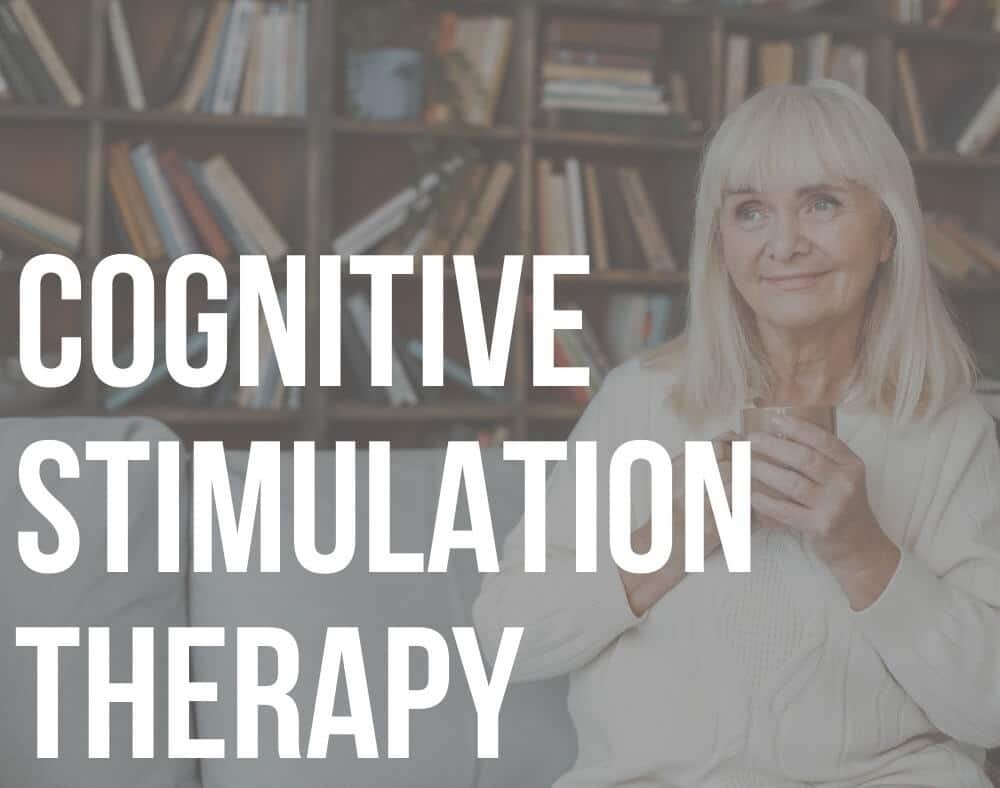If you would like to understand the link between cognitive stimulation therapy and dementia, I cover it all in this extensive article.
What if there was a treatment for mild to mid-stage dementia that could improve cognitive functioning as effectively as dementia medications, but without side effects? What if it was inexpensive, accessible and enjoyable for the person with dementia? In fact, what if there already is?
If you live in England, chances are you’re already familiar with Cognitive Stimulation Therapy.
Cognitive Stimulation Therapy and Dementia
It is considered a standard of care in the UK, and it is recommended and provided for most or all British individuals with dementia who choose to participate.
The word — and research — on CST is getting out to other countries, and cognitive stimulation therapy programs are growing around the world.
At least, that is, they were growing until the pandemic put a stop to group gatherings, especially for older adults.
However, there are adaptations being developed for this exciting therapy as scientists, experts, and group leaders explore how to best translate the program to an online format.
What is Cognitive Stimulation Therapy?

Cognitive stimulation therapy is an evidence-based group treatment modality designed for people with mild to moderate dementia.
It was developed in the United Kingdom by Dr. Aimee Spector and a team of dementia specialists after rigorously researching the efficacy of various non-drug dementia interventions.
Since its inception in 2003, an abundance of evidence has shown that CST significantly improves participants’ cognitive functioning, mood and quality of life.
CST Aims to Improve Cognitive Functioning
The evidence shows that CST is as effective as dementia medication for improving cognitive functioning.
CST is the only non-medical intervention that the British government for the treatment of dementia endorses.
In fact, it is considered a standard of care in the UK to be referred to a CST group upon being diagnosed with dementia.
Few barriers interfere with the implementation of cognitive stimulation therapy. CST groups can be led by essentially anyone who works with people with dementia.
It’s not restricted to highly credentialed medical professionals. There is no extensive training or special equipment necessary, so the cost of the program is low.
All that’s needed is a manual, a modest training program, and a few simple supplies.
Who can Administer Cognitive Stimulation Therapy?

Cognitive Stimulation Therapy is designed to be successfully administered by anyone who works with people with dementia.
This includes care workers, psychologists, occupational therapists and nurses.
A basic CST training program ensures that facilitators understand the guiding principles of the program. Also to understand how to apply them in a standardized, yet person-centered, and effective way.
Available training manuals offer instruction on how to lead a CST group.
They discuss the key principles of the therapy, include detailed session plans, and other instructions on how to monitor participants’ progress.
What is a CST Session Like?

Traditional Cognitive Stimulation Therapy sessions utilize a group format to capture the benefits of social interaction.
It is a set series of sessions, usually given twice per week over seven weeks.
CST sessions can occur in a variety of settings, from private homes to hospitals, facilities or day programs.
They should take place in a comfortable environment that is conducive to learning and social engagement.
CST stimulates particular cognitive skills
CST sessions are designed to exercise and stimulate specific cognitive skills. The first session begins by having the members designate a name for their group.
The same participants join throughout the series of sessions.
Attention to consistency throughout the sessions is an important feature. For example, each session begins with the same warm-up activity.
Each session has a different theme, such as “Physical Games”, “Childhood”, “Food”, “Current Affairs” or “Number Games”. Sessions typically last an hour.
A reality orientation board is posted throughout the series of sessions, which displays information about each participant.
As the participants interact with each other, they get to know one another, which contributes to feelings of friendship and support.
What are the Benefits of CST?

The benefits of Cognitive Stimulation Therapy are well documented and include a significant improvement in cognitive functioning.
In order to quantify data, researchers often use tools that measure memory, orientation, language and visuospatial abilities. These tools include:
- The Mini-Mental State Examination (MMSE)
- The Alzheimer’s Disease Scale-Cognitive Subscale (ADAS-COG)
Because these standardized forms are also often used to measure the efficacy of Alzheimer’s drugs and other modalities, it is easy to directly compare the results.
CST shows an improvement in cognitive areas measured by these tools comparable to anti-dementia drugs.
Other noted benefits of CST include a significant improvement of language skills (such as naming objects, word-finding, comprehension) and quality of life.
Quality of life is determined by the participants using the QoL-AD tool.
Caregivers of CST participants with dementia consistently report an improved quality of life for themselves, as well as for their loved ones.
They report improvements in their loved ones’ moods, confidence and ability to concentrate.
Both the participants and caregivers describe participation in the groups as feeling supportive and positive.
What are the Variations of CST?
As Cognitive Stimulation Therapy matures and becomes more widespread, more variations are innovated to meet more specific cultures or preferences of individual participants.
For example, Saint Louis University’s Geriatric Education Center in Missouri, USA has developed several variations of CST of their own, including an exercise-based group, a spiritual group and a caregiver-assisted group.
Individual Cognitive Stimulation Therapy (iCST)

Individual Cognitive Stimulation Therapy (iCST) is a newer variation of this modality.
It is designed to provide the therapeutic benefits of CST on a one-to-one basis, rather than a group setting.
It can be administered to the person with dementia by a friend or family member with iCST training.
An iCST program includes 75 activity sessions which are intended to be provided over three 30-minute sessions for 25 weeks.
Each iCST session begins with five minutes of orientation information, followed by five minutes of current news and events, and then twenty minutes of the main activity.
The main activity themes include topics such as “Life Story”, “Word Games”, “Art”, “Reminiscence” and others.
In one research study, individuals with dementia participating in iCST programs did not experience the same cognitive gains of the traditional group-based sessions, but there were significant benefits nonetheless.
The individual and their carer reported a much better quality of the relationship. The carers also reported a measurably better quality of life and fewer symptoms of depression.
Both the individuals with dementia and their carers expressed enjoying the program and felt that it ignited an interest in mentally stimulating activities.
Individual Cognitive Stimulation Therapy is an excellent alternative when group sessions aren’t available or practical. During the COVID-19 pandemic, this need has become especially widespread.
It’s also useful anytime those who don’t enjoy group interaction and people who can’t get to group sessions for reasons such as compromised health or mobility.
Maintenance CST
While Cognitive Stimulation Therapy is typically designed as a series that concludes after 14 sessions, an adaptation for ongoing “maintenance” therapy is in the works.
Designed for longer-term treatments, Maintenance CST can extend the period of benefits. One research study concluded that long term benefits of maintenance CST were especially powerful in terms of improved quality of life, with the cognitive improvements tapering off over time.
Virtual Cognitive Stimulation Therapy (vCST)

Virtual Cognitive Stimulation Therapy (vCST) was born in response to an urgent need created by the COVID-19 pandemic. Still in its early stages, vCST is taking shape in various ways.
Adapting group sessions to an online format, providing iCST to an individual online (with in-person support from a family member), and training family caregivers to provide individual CST in-home sessions are areas that have been explored, and are ripe with potential.
Individual cognitive stimulation therapy sessions are now being offered online through Washington University Physicians Occupational Therapy.
Their goal is to train carers to administer sessions at home with their loved ones.
A therapist works with the individual with dementia and their caregiver over seven virtual sessions and supports them as they work through the process.
A binder of material is provided with this program.
Researchers at the University College of London and Hong Kong University have been collaborating to adapt CST into virtual sessions so people with dementia can experience the best possible benefits of the program in the alternate format.
What is Next for CST?
Already being used in at least 33 different countries, scientists are developing ways to introduce and grow Cognitive Stimulation Therapy sessions across different cultures and different socio-economic populations.
International train-the-trainer programs exist in Denmark, Norway, Germany, China, New Zealand and USA.
A three-year study is currently investigating how to best implement CST in low to middle income nations, including Brazil, India and Tanzania.
A similar program, called SAIDO Learning, exists in Japan and demonstrates comparable results.
An adapted model of CST intended for people in the moderate to severe stages of dementia is also currently under development in London.
Where to Learn About Online CST Training
To learn more about CST training opportunities, including access to a series of free online training video modules, visit the Saint Louis University website.
To learn about opportunities for online iCST training visit the iCST website.

